A new, highly-destructive industry is preparing to provide electric vehicle manufacturers with minerals from the deep seabed. Let’s encourage EV companies to refuse this dangerous deal and commit to protecting the oceans.
As people have become increasingly aware of the environmental harm caused by fossil fuels and feel the impact of rising gas prices, many are choosing to transition away from cars with combustion engines to electric vehicles (EVs). They are part of a huge wave seeking out options for green energy and green transportation. The International Energy Agency (IEA) reports that sales of electric cars hit 6.6 million in 2021, more than tripling their market share from two years earlier.
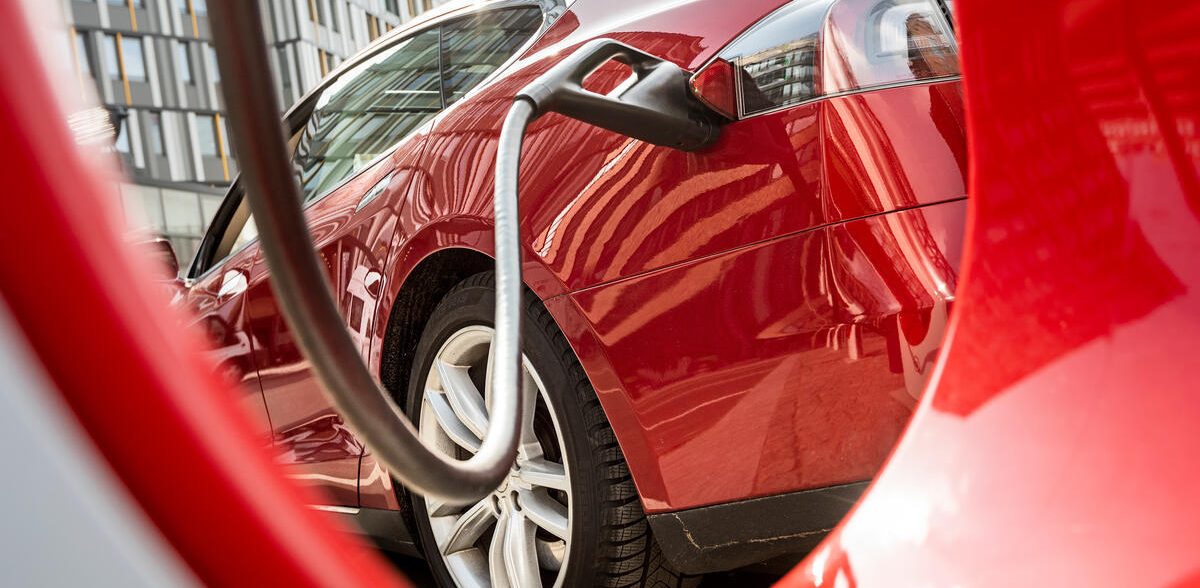
Charging station for electrically powered vehicles exclusively for Tesla in Berlin, Germany, in March 2021
EVs are an important part of the transition to a green transportation system. We need them to help us reach carbon neutrality by 2050 and to fight climate change. However, they are not a panacea for the energy, transport, and climate crises we face. EV batteries rely on energy minerals such as manganese, cobalt, copper, and nickel, which are usually sourced from land-based mines. These mines are notorious for their negative environmental and social impact.
Transport transition cannot be green if it requires deep sea mining for EVs
As EVs grow in popularity, so have the misleading claims from various quarters that more of these minerals are needed to support the green transport transition. EV companies can and should reduce the need for minerals by scaling up closed-loop battery recycling and investing in battery efficiency and new chemistries. Instead, mining corporations prefer to turn their sights to the deep sea – one of the world’s largest, most fragile, and most important ecosystems. The International Seabed Authority (ISA), the body charged with protecting the ocean and the seabed resources as the ‘common heritage of Humankind,’ has been criticized by civil society for working closely with prospective deep sea mining companies and fast-tracking regulations that could allow the deep sea mining industry to begin operations as early as July 2023.
Mining methods would vary depending on the type of mineral deposit, but the end result would all be the same: destruction. Options being explored include disruptively mining nodules on the seabed floor to invasive excavation and even demolition, like mountaintop removal methods on land, to extract ore deposits.
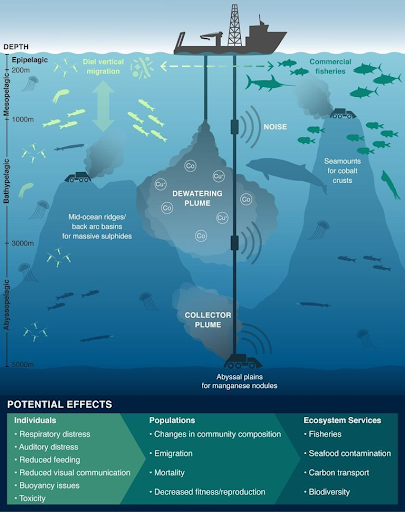
Source: Drazen, et al. (2020), Scientists: Sea Floor Mining Is Basically as Bad as It Sounds
Over 600 scientists and policy experts have warned that the launch of this industry will lead to irreversible biodiversity loss, disruption of one of the world’s largest carbon sinks, and damage the fragile ocean environment, which provides benefits such as medicines and fisheries. Furthermore, deep sea mining would not replace terrestrial mining. It will only increase the strain on an already stressed ecosystem.
Who profits and who pays?
We all stand to be impacted by changes in the oceans, the largest ecosystem on earth. However, the potential for sedimentation of reefs, degradation of fisheries, water pollution, wildlife decline, and accelerated impacts of climate change from deep sea mining will affect island and coastal communities first and foremost, a large proportion of which are indigenous communities.
Pacific nations, located closest to the Clarion Clipperton Zone where these activities will be carried out, are on the frontline. Many of these communities have already suffered the impact of terrestrial mining, and are all too familiar with the social and economic injustices these industries impose. They have the most to lose and so little to gain as the age-old colonial paradigm is set to play out again, with mining corporations reaping the bulk of the profits.
The transition to green energy is vital, but it cannot come at the expense of the oceans and the lives and livelihoods it sustains.
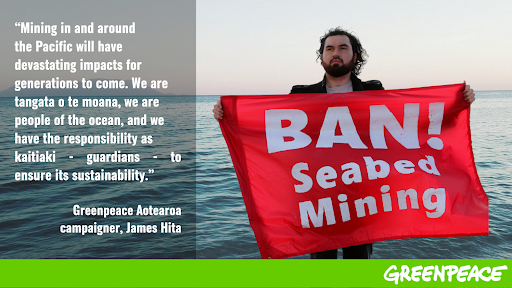
“Mining in and around the Pacific will have devastating impacts for generations to come. We are tangata o te moana, we are people of the ocean, and we have the responsibility as kaitiaki – guardians – to ensure its sustainability.”
Greenpeace Aotearoa campaigner, James Hita
More car companies are committing to no deep sea minerals, but General Motors, Ford, and Tesla still need to take a stand.
Electric vehicle companies could comprise a significant share of the end market for deep-sea mined minerals. Therefore, they also have the opportunity to demonstrate leadership that prioritizes the well-being of people and our planet.
Rivian, BMW, Volvo Group, Volkswagen, and Renault have already taken action for a clean energy future by supporting the call for a moratorium and committing to exclude deep sea minerals from their supply chains. However, American companies Tesla, Ford, and General Motors have remained silent on one of the most critical issues that will decide the fate of the oceans. This is unacceptable.
Let’s encourage car companies to join the growing movement against deep sea mining
Momentum against deep sea mining is growing as more countries, civil society, long-standing Pacific activists, scientists, automobile and technology companies, financial institutions, and the fishing industry have stated that it is just not worth the risk.
The support of electric vehicle industry heavyweights for a moratorium on deep-sea mining sends a crucial message to the public and investors that a market for these minerals does not exist at all.
We are calling on US automakers Ford, General Motors, and Tesla to come forward and take a stand to protect the oceans. You can help.
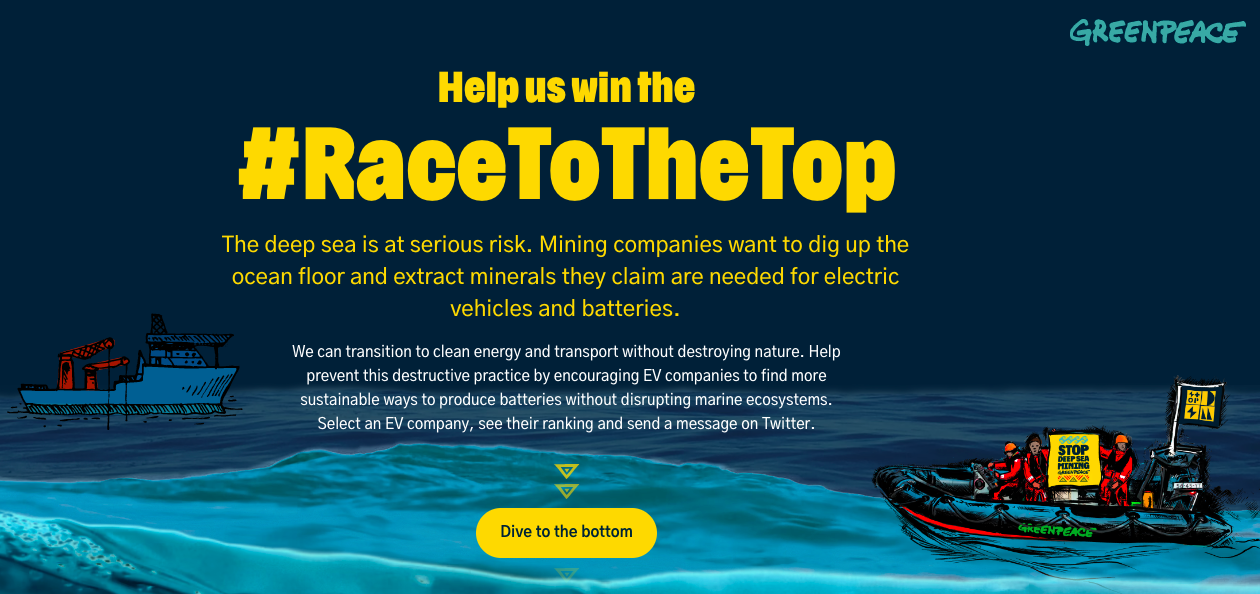
Check out our Race to the Top online ranking and click-2-tweet app to challenge and rank electric vehicle manufacturers, like Tesla, GM, Ford, and more, on where they publicly stand on shutting down a potential deep sea mining industry.

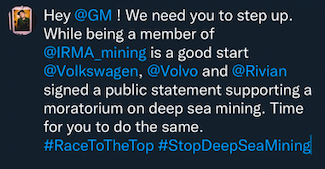
Let’s win the race to the top! Take action now to check out the leaderboard and send a tweet to EV automakers. You can also add your name to our petition!
